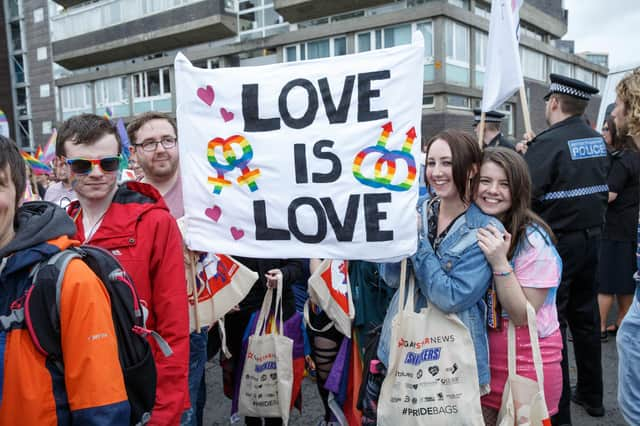LGBTQ equality: MSPs must act to restore Scotland’s reputation as a world leader – Dr Kevin Guyan
This article contains affiliate links. We may earn a small commission on items purchased through this article, but that does not affect our editorial judgement.


Beyond those directly involved, incidents that target LGBTQ people have a chilling effect on the wider community as they encourage individuals to police their behaviours and interactions in public spaces.
Homophobic slurs are not an example of ‘bad people’ doing ‘bad things’ but reflect a society where certain views, attitudes and behaviours are normalised or understood as acceptable.
Advertisement
Hide AdAdvertisement
Hide AdViolence and the use of derogatory language are only the more recognisable face of a two-sided coin. More common and harder to identify are insidious claims that frame LGBTQ people as lesser or undeserving of support from those in positions of power.
Responding to this challenge therefore does not lie in enhanced policing powers or the need for more vigilance by those affected. Rather, it is Scotland’s parliamentarians that have a vital role to play in how LGBTQ people are discussed in political debates, schools, workplaces, the media and in the roll-out of legislation and policies.
Yet, in recent years, the Scottish Parliament has adopted a timid approach to the question of LGBTQ rights.
As the country once regarded as the best place in Europe for LGBTI legal equality, Scotland and the rest of the UK increasingly looks two steps behind many international comparators.
In 2021, several other countries made advances such as Spain (which approved a draft bill for gender self-identification for those aged over 14), the USA (which expanded gender markers on passports to also include ‘X’ alongside ‘F’ and ‘M’) and Wales (which is running a consultation on its ambitious LGBTQ+ Action Plan).
No country’s approach is perfect nor is anywhere immune to anti-LGBTQ hate crime, yet failure to mirror developments in other countries (particularly in relation to trans rights) means that Scotland’s LGBTQ credentials have suffered.
Why the hesitation? When MSPs return to parliament on August 30 after the summer recess, they have no shortage of business waiting in the wings to help bolster Scotland’s reputation for progressive LGBTQ legislation and policies.
Most notably, results from the second consultation into reform of the Gender Recognition Act (GRA), conducted in early 2020, are ready to publish.
Advertisement
Hide AdAdvertisement
Hide AdReform of the GRA intends to simplify the process by which trans people gain legal recognition of their lived gender, through a gender recognition certificate, and change the sex marker on their birth certificate.
The parliament can also look to bring forward legislation to ban conversion therapy (interventions to erase, repress or change the sexual orientation and/or gender identity of a person), following a consultation on the issue conducted by the Equalities, Human Rights and Civil Justice Committee this summer.
Other actions include the finalisation of guidance from the government’s Sex and Gender in Data Working Group and the delivery of a census in 2022 that asks questions about gender, sex and sexuality that are inclusive of LGBTQ people.
The final year of the previous parliamentary session spent too much time as a forum to ‘debate’ the lives and experiences of LGBTQ people, which provided space for campaign groups opposed to trans inclusion to air their views.
Hostility towards trans-inclusive data practices and the policing of people’s gender, sex and sexuality materialised in deliberations over the Census (Amendment) (Scotland) Bill, Forensic Medical Services (Victims of Sexual Offences) (Scotland) Bill and the Hate Crime and Public Order (Scotland) Bill.
Simply saying that Scotland is a great place for LGBTQ people does not bring this ambition into being. Likewise, offers to explore, investigate or consult on issues that impact LGBTQ lives are not enough.
For example, yet another consultation on reform of the GRA would be the third time this exercise has been conducted in Scotland since 2017.
As someone who works every day with data, there comes a point where we need to draw a line and say that we do not need more information on the extent of the problem.
Advertisement
Hide AdAdvertisement
Hide AdEven during the height of the Covid-19 pandemic in Scotland, LGBTQ organisations continued to publish new research that expands our current evidence base.
Considering just two recent examples, the Equality Network published research into the experiences of LGBT people in Scotland’s rural regions, while Time for Inclusive Education reported on the online experiences of young people in Scotland during the spring 2020 Covid-19 lockdown.
We also need to pause and ask who is this evidence intended to convince? Most LGBTQ people already know that homophobia, biphobia and/or transphobia exist, permeating all elements of everyday life. For people with first-hand experiences, data is not necessary to prove the existence of these problems.
The burden of proof is therefore required for a cis, heterosexual/straight audience who may or may not take action, depending on the quality of the proof provided.
With a governing arrangement between the SNP and Greens looking likely, the second half of 2021 presents the Scottish Parliament with an opportunity to change gear.
We now have enough information about the ‘problems’ that LGBTQ people face and an evidence base to guide policymakers on how best to respond.
Action must now follow. As Scotland’s most diverse parliament, this marks a moment for a refreshed and renewed opportunity to challenge hostility towards LGBTQ people and take action that begins to rebuild Scotland’s reputation as a country leading in terms of LGBTQ rights.
Dr Kevin Guyan is a research fellow at the University of Glasgow. He is the author of the forthcoming book Queer Data: Using Gender, Sex and Sexuality Data for Action
